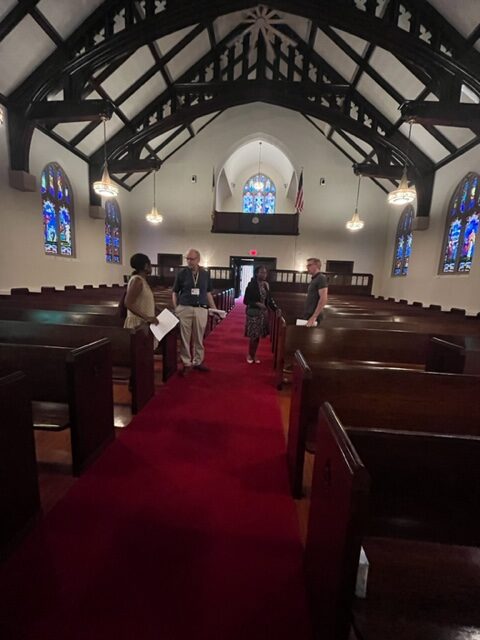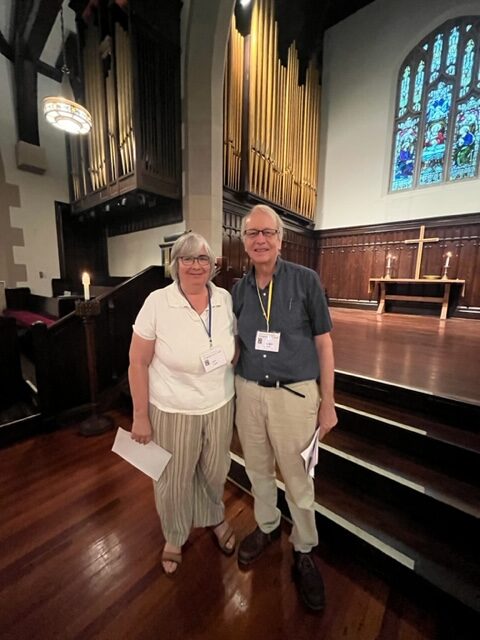When anyone hears the message about the kingdom and does not understand it, the evil one comes and snatches away what was sown in their heart. This is the seed sown along the path. The seed falling on rocky ground refers to someone who hears the word and at once receives it with joy. But since they have no root, they last only a short time. When trouble or persecution comes because of the word, they quickly fall away. The seed falling among the thorns refers to someone who hears the word, but the worries of this life and the deceitfulness of wealth choke the word, making it unfruitful. But the seed falling on good soil refers to someone who hears the word and understands it. This is the one who produces a crop, yielding a hundred, sixty or thirty times what was sown.
Matthew 13:18-23
Worshippers on Sunday, July 16, 2023, were encouraged to consider the origins and impact of systemic racism and other types of bias during a Newton Highlands Congregational Church (NHCC) service designed by long-time member Randy Ellis. Mr. Ellis is a professor of economics at Boston University. His wife, deacon Joy Huber, assisted with the service.

In his sermon, “Systemic Bias from a Woke Christian,” Mr. Ellis discussed examples of systemic bias in the city of Boston, at top research universities, in athletic scholarships, and in the Bible and faith communities. Systemic bias includes institutional policies and beliefs that underlie racism, sexism, nationality bias, and many other forms of prejudice.
Stated Mr. Ellis, “For the past five years, I have been reading intensively about racism, sexism, and other forms of prejudice and bias…I apologize that this may seem more like a lecture than a sermon, but I promise you that there will no quiz at the end!”
Providing an example of systemic bias, Mr. Ellis pointed out that one of his selected hymns for the service, “Lord I want to be a Christian,” is a negro spiritual, which means that it does not have a copyright and does not generate any revenues for the original owners or composers of the song.
United Church of Christ and NHCC milestones
Mr. Ellis reflected on the pride he feels as a member of a progressive, socially minded church that is part of the United Church of Christ (UCC). He shared the following milestones:
- 1783: Massachusetts, with leadership by its many Congregational churches, was the first state to ban slavery.
- 1839: New England UCC churches led the legal defense of the Amistad slave ship passengers; this was the first successful slave revolt that freed Africans and helped them return home.
- 1970s: NHCC had already called a husband-and-wife ministry team as joint senior pastors.
- 1990s: NHCC was the among the first churches in the state to become an Open and Affirming congregation, welcoming gay members, and calling a lesbian associate pastor soon thereafter.
- 2000s: NHCC voted twice to broaden the set of LGBTQ+ folks welcomed into the congregation.
“Perhaps during the 2020’s NHCC will take an even more active stance in identifying, educating, and acting to reduce systemic biases that linger among us,” he closed.
Suggested readings
Mr. Ellis shared the names of several books he has read to learn about systemic racism. These include the following titles:
- So You Want to Talk about Race by Ijeoma Oluo
- How to Be an Antiracist by Ibram X. Kendi
- Caste: The Origins of Our Discontents by Isabel Wilkerson
- The Color of Law: A Forgotten History of How Our Government Segregated America by Richard Rothstein
- The 1619 Project by The New York Times
Catch the service on YouTube
Thanks to remote masterminding by Misha Hill, the service is available on NHCC Worship, the YouTube channel of Newton Highlands Congregational Church. The sermon starts at 29:47.

